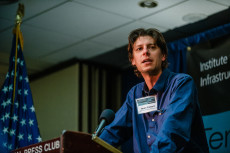CRD’s Sean Peisert Shares Cyber Security Expertise at I3P Meeting
October 26, 2012
Sean Peisert, a research scientist in Berkeley Lab's Computational Research Division, recently gave a presentation talk at the 10th Anniversary of the Institute for Information Infrastructure Protection (I3P), held Oct. 10 at the National Press Club in Washington, D.C. Peisert discussed the impact of I3P, a consortium of leading universities, national laboratories and nonprofit institutions dedicated to strengthening the cyber infrastructure of the United States.
Peisert, a computer security researcher, has been involved with the I3P since 2007 when he was awarded a $150,000 I3P Research Fellowship. Today along with Deb Agarwal, he has continued his involvement as one of LBNL's two representatives to the I3P. At the anniversary event, Peisert spoke about his views on the role of the I3P, as well as how the I3P has impacted his own research at LBNL over time. In addition to Peisert, other CRD researchers who have been I3P Fellows include Robin Sommer (2006) and Sean Whalen (2010-11).
About Berkeley Lab
Founded in 1931 on the belief that the biggest scientific challenges are best addressed by teams, Lawrence Berkeley National Laboratory and its scientists have been recognized with 16 Nobel Prizes. Today, Berkeley Lab researchers develop sustainable energy and environmental solutions, create useful new materials, advance the frontiers of computing, and probe the mysteries of life, matter, and the universe. Scientists from around the world rely on the Lab’s facilities for their own discovery science. Berkeley Lab is a multiprogram national laboratory, managed by the University of California for the U.S. Department of Energy’s Office of Science.
DOE’s Office of Science is the single largest supporter of basic research in the physical sciences in the United States, and is working to address some of the most pressing challenges of our time. For more information, please visit energy.gov/science.










